Now enjoying a much deserved retirement, the hotel’s famous chef talks about his many years in “the world’s best hotel”
By Colin Hastings
| IN all the years that I’ve known Chef Norbert A. Kostner – and that’s a very long time – I can’t recall ever seeing him in anything but his chef’s uniform. But then, because of his self-imposed gruelling work schedule of up to 18 hours a day, six days a week while he worked for more than four decades at Mandarin Oriental, Bangkok that’s hardly surprising. Norbert has always been the consummate chef, married to his kitchens and loyal right up to the last guest’s order. You have to wonder whether he occasionally slept in his all-white tunic. Probably he did. Even for this interview, two years after he retired from the Oriental, the hotel where he gained legendary status for 41 years’ immaculate service, he’s wearing his chef’s outfit. Sitting in the Oriental’s elegant Authors’ Wing, he says he’s back at the hotel temporarily to prepare a Gourmet Tour dinner for 150 guests to be held at the Royal Project in Doi Angkang in northern Thailand. Staff spot him immediately and come over to pay homage to the dapper little man who devoted so much of his life to this hotel. You have to wonder whether they would have recognized him if he hadn’t been wearing that all-white uniform. |
Norbert is an Advisor to the Royal Projects, and fiercely proud of his appointment. This particular assignment is a one-off. These days Norbert is enjoying his well-deserved retirement and, apart from these royal functions, he dismisses any possibility of a ‘celebratory’ or ‘guest chef’ appearance at the hotel he served so well, or anywhere else for that matter. He’s much happier just reminiscing about his amazing life as one of Asia’s most famous chefs.
Born in Ortisei, a small village in northern Italy in 1945, Norbert often refers to himself as someone “from the mountains.” From humble beginnings in the Alps, he went to neighbouring Switzerland to learn his trade, working his way up in a number of renowned restaurants.
He first arrived in Thailand in 1970 to become Assistant Executive Chef at the newly opened Dusit Thani Hotel. It was a three-month contract that lasted four years, with Norbert rising through the ranks to become Chef of the Main Kitchen and Chef Grande Manager.
In 1974, he moved across town to the Oriental where he was appointed Executive Sous Chef. Like his counterparts in other Bangkok hotels at that time, Norbert faced challenges that would confound today’s chefs.
“Back then, imported food products were in short supply. For example, we didn’t even have cream. So we had to make our own, using milk from a local Indian dairy and pasteurizing it. Potatoes were impossible to find and the only beef we got was smuggled in through the American military bases stationed in Thailand.
“Today, we have access to everything – the best wagyu beef, imported fish, vegetables and all the top products.”
In 1977, the Oriental expanded with the opening of the River Wing in a spectacular celebration overseen by Her Majesty Queen Sirikit. It was a momentous and exciting time that saw the hotel voted the world’s best, a title it held and trumpeted with gusto for ten consecutive years. Internationally acclaimed singers like Eartha Kitt and Tina Turner jetted into town to entertain guests in the hotel’s Golden Barge (now Lord Jim’s) and its sumptuous ballroom. Celebrities from across the globe regularly checked in to see what all the fuss was about.
| Behind the scenes, however, Norbert and his team were facing a different kind of challenge. “We had new kitchens in the River Wing, but we weren’t involved in their design, nor did we influence the choice of equipment. They just removed a partition and announced: ‘This is your new kitchen.’ We just had get on with it. From the old kitchens, we managed to keep one cutting machine that was destined for the scrap heap. We hid it for two months – until they got fed up looking for it. Then it went to be used for another 20 years.” With the hotel enjoying full or near-full occupancy on most days, the kitchen staff increased from 70 to 150 workers. The hotel was abuzz with non-stop activity. Ever the loyal employee, and loving his job, Norbert set himself a schedule that was relentless and unchanging for the next four decades. “I arrived at the office every day at 6 am, or thereabouts, to make sure everything was alright. Hotel guests are 24 hours a day. We had to be here for them. “I often worked late, maybe to 11 pm or even later, and I always attended our outside functions. If a young trainee or commis chef was expected to stay until the end, then I’d have to be there too. ‘Chef’s gone home’ is not what should be heard.” In 1980, Norbert was appointed the hotel’s Executive Chef, in charge of all the Oriental’s kitchens, succeeding Michel Grange, the man accredited with turning the Normandie Grill into one of Asia’s top restaurants and the hotel into a destination for genuine gourmets. It was going to be a tough act to follow, but Norbert’s dedication to the job hadn’t gone unnoticed. |
| Norbert remembers the day of his appointment as if happened last week. “The hotel’s general manager, Kurt Wachtveitl, called me at nine in the morning – he never called me that that early in the day, so I knew it was about something very important. He sounded very serious. “When I walked into his office, Kurt had a huge smile on his face and said ‘congratulations, you are the hotel’s new executive chef. “Kurt then told me to take a holiday the next day. I went back to my office and opened a bottle of champagne. Back then, I didn’t even have a suitcase, but I did go on holiday, though I can’t remember where.” It was a life-changing moment, but one that did not fit into Norbert’s original plans. “Actually, I had tried to leave the Oriental several times in the past. I wanted to work in China. That was my dream, even though I’d never been there. I’d even started to learn Chinese. But then I’d got married here in Thailand, started a family and then the new job.” |
For the next 35 years, Norbert ran the Oriental’s kitchens. The responsibilities were vast, complex and time-consuming. For in addition to the hotel’s restaurants and in due course, some years after, the Oriental’s three retail outlets located around Bangkok, he oversaw the catering of a long list of prestigious events, such as the SEA Write awards and the Bangkok Chef’s Charity, as well as numerous royal banquets presided over by members of Thailand’s Royal Family. He also catered for visiting royalty as well as numerous foreign heads of state.
Ensuring that every event went without a hitch was always uppermost in Norbert’s mind. Once, while catering an important function at Chakri Hall, he instructed his staff to dismantle some of the hotel’s kitchen equipment and transport it to the venue. “They had their own equipment, which was just fine, but I wanted to make sure that we had a back-up, just in case.” On the night, the hotel’s equipment wasn’t need, but Norbert’s contingency plans are a measure of his dedication.
That said, he is fully aware of his fallibility. “I learned to cook in a small restaurant and I’m still learning. With cooking, you never know it all. Recently I made some butter cookies for my daughter. She said they weren’t as good as the ones she bought in a supermarket, so I’ll make them again.”
Not surprisingly, the name of Kurt Wachtveitl, his boss for all but the last three years of Norbert’s career, features in many of his conversations about the past. Their careers at the Oriental overlapped by many decades and both played key roles in the hotel’s day to day operations; mutual respect was absolutely essential. That they got on so well was clearly a significant factor in the hotel’s longtime success and international recognition.
“Kurt was an exceptional general manager and a genuine connoisseur,” says Norbert, still clearly in awe of the man reckoned by many to be Thailand’s finest-ever hotelier. Kurt retired in 2009 after 44 years at the helm. “You could see it in the way he dressed, the suits and the shoes he wore. And he was always right. He had a sixth sense.
“Kurt was always there – he knew everything. Before a function, he’d come to the kitchens and ask to taste the food. It happened often. He wanted to know everything was in order.
“He’d often eat with me in my office – it was always something simple to eat. Kurt said food must be fantastic and memorable. If a guest returns a year and ask for the same dish, even if it’s something simple like a club sandwich, it must taste the same.
“His motto was ‘simplicity is elegance.’
“Under Kurt I never had complaints about food costs. In fact, sometimes he wondered if they were too low.”
General consensus is that the 1980s under Kurt were the Oriental’s ‘golden decade,’ Norbert, with typical diplomacy, won’t join the chorus. Asked about this, he replies: “They were all golden years, from 1974 until I retired in 2015.”
All of Norbert’s reminiscences are seemingly coated in gold. Apart from one incident when his staff ran short of a soup starter for a function because of accidental spillage and smaller serving cups had to be used instead “without a single complaint from the guests”, he claims that he can’t recall any kitchen disaster in over 40 years.
Norbert talks endlessly and passionately about the profession he still loves. “You have to cook as if you’re cooking for a blind person – a duck has to taste like a duck, a trout like a trout. But you have to start with the best products. For a good tomato sauce, for example, you have to use a good tomato. For Thai food, you use Thai ingredients, and for Italian dishes, you use Italian ingredients. It’s simple, really.
“Being a chef is like conducting an orchestra – the musicians can play by themselves, but they’re much better with a conductor.
“These days, chefs are different. They work with computers. I drew every course by hand.
“I came from the mountains in northern Italy and back there they think I’m the best chef in the world. That’s important to me.
“Like a durian, you either love being a chef or you hate it. Whatever I’ve done, I’ve loved it,” he muses.
Norbert has a son who has followed his father as a chef, and a daughter who works in finance. Sadly, his Thai wife passed away 17 years ago.
His favourite chefs are the American Thomas Keller and Joël de Robouchon.
Soon to celebrate his 72nd birthday, Norbert splits his time between Bangkok and Europe, where he keeps fit by undertaking long walks in Italy and Spain.
As we part company, I wonder for a brief moment whether I too would recognise Norbert if he wasn’t wearing his chef’s uniform. Actually, I’m not sure I would.
Ensuring that every event went without a hitch was always uppermost in Norbert’s mind. Once, while catering an important function at Chakri Hall, he instructed his staff to dismantle some of the hotel’s kitchen equipment and transport it to the venue. “They had their own equipment, which was just fine, but I wanted to make sure that we had a back-up, just in case.” On the night, the hotel’s equipment wasn’t need, but Norbert’s contingency plans are a measure of his dedication.
That said, he is fully aware of his fallibility. “I learned to cook in a small restaurant and I’m still learning. With cooking, you never know it all. Recently I made some butter cookies for my daughter. She said they weren’t as good as the ones she bought in a supermarket, so I’ll make them again.”
Not surprisingly, the name of Kurt Wachtveitl, his boss for all but the last three years of Norbert’s career, features in many of his conversations about the past. Their careers at the Oriental overlapped by many decades and both played key roles in the hotel’s day to day operations; mutual respect was absolutely essential. That they got on so well was clearly a significant factor in the hotel’s longtime success and international recognition.
“Kurt was an exceptional general manager and a genuine connoisseur,” says Norbert, still clearly in awe of the man reckoned by many to be Thailand’s finest-ever hotelier. Kurt retired in 2009 after 44 years at the helm. “You could see it in the way he dressed, the suits and the shoes he wore. And he was always right. He had a sixth sense.
“Kurt was always there – he knew everything. Before a function, he’d come to the kitchens and ask to taste the food. It happened often. He wanted to know everything was in order.
“He’d often eat with me in my office – it was always something simple to eat. Kurt said food must be fantastic and memorable. If a guest returns a year and ask for the same dish, even if it’s something simple like a club sandwich, it must taste the same.
“His motto was ‘simplicity is elegance.’
“Under Kurt I never had complaints about food costs. In fact, sometimes he wondered if they were too low.”
General consensus is that the 1980s under Kurt were the Oriental’s ‘golden decade,’ Norbert, with typical diplomacy, won’t join the chorus. Asked about this, he replies: “They were all golden years, from 1974 until I retired in 2015.”
All of Norbert’s reminiscences are seemingly coated in gold. Apart from one incident when his staff ran short of a soup starter for a function because of accidental spillage and smaller serving cups had to be used instead “without a single complaint from the guests”, he claims that he can’t recall any kitchen disaster in over 40 years.
Norbert talks endlessly and passionately about the profession he still loves. “You have to cook as if you’re cooking for a blind person – a duck has to taste like a duck, a trout like a trout. But you have to start with the best products. For a good tomato sauce, for example, you have to use a good tomato. For Thai food, you use Thai ingredients, and for Italian dishes, you use Italian ingredients. It’s simple, really.
“Being a chef is like conducting an orchestra – the musicians can play by themselves, but they’re much better with a conductor.
“These days, chefs are different. They work with computers. I drew every course by hand.
“I came from the mountains in northern Italy and back there they think I’m the best chef in the world. That’s important to me.
“Like a durian, you either love being a chef or you hate it. Whatever I’ve done, I’ve loved it,” he muses.
Norbert has a son who has followed his father as a chef, and a daughter who works in finance. Sadly, his Thai wife passed away 17 years ago.
His favourite chefs are the American Thomas Keller and Joël de Robouchon.
Soon to celebrate his 72nd birthday, Norbert splits his time between Bangkok and Europe, where he keeps fit by undertaking long walks in Italy and Spain.
As we part company, I wonder for a brief moment whether I too would recognise Norbert if he wasn’t wearing his chef’s uniform. Actually, I’m not sure I would.
|
Bio Data:
Name: Norbert A Kostner Nationality: Italian Date of Birth: 21 May 1945 Place of Birth Ortisei, Italy Marital Status: Married with two children (son and daughter) Work Experience: 2012 – 2016 Culinary Director Mandarin Oriental, Bangkok 1980-2012 Executive Chef Mandarin Oriental, Bangkok 1974 – 1980 Executive Sous Chef Mandarin Oriental, Bangkok 1970 –1974 Assistant Executive Chef Chef of the Main Kitchen and Chef Grande Manager Dusit Thani Hotel, Bangkok 1964 –1970 Worked in several renowned hotels in Switzerland Before coming to Thailand 1961 –1964 Apprenticeship in Italy Others: Special position: Advisor to agricultural Royal Projects in Chiang Mai, Thailand Languages: English, German, Italian, French and Thai Interests: Languages, Sports and Ancient Philosophy |

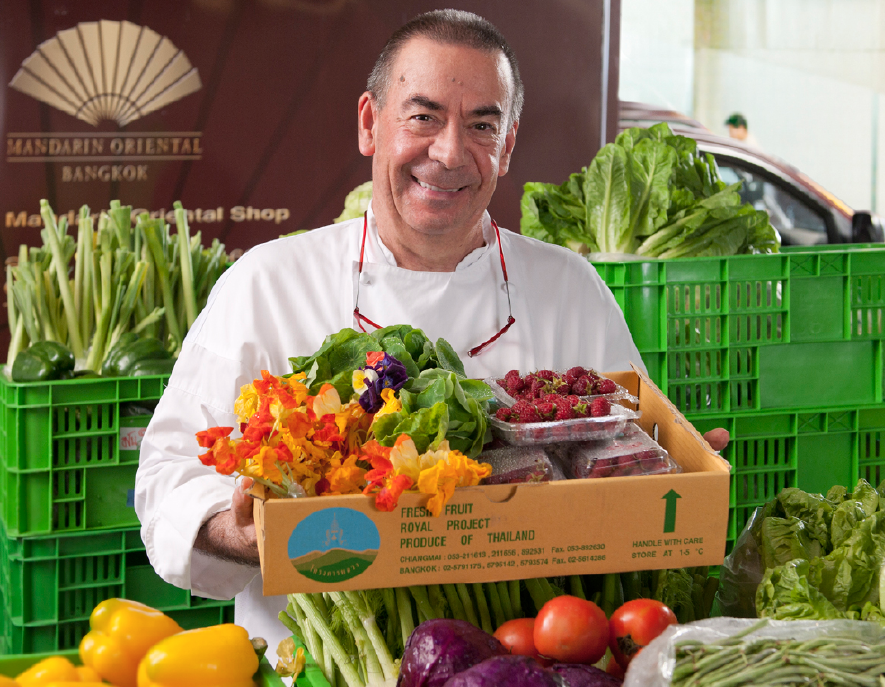
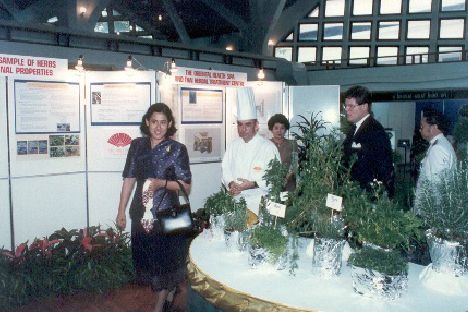
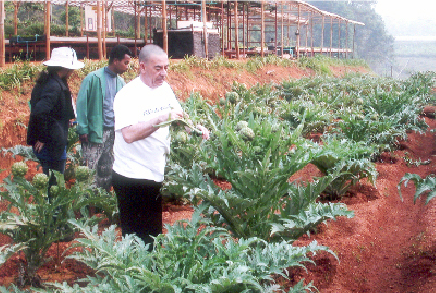
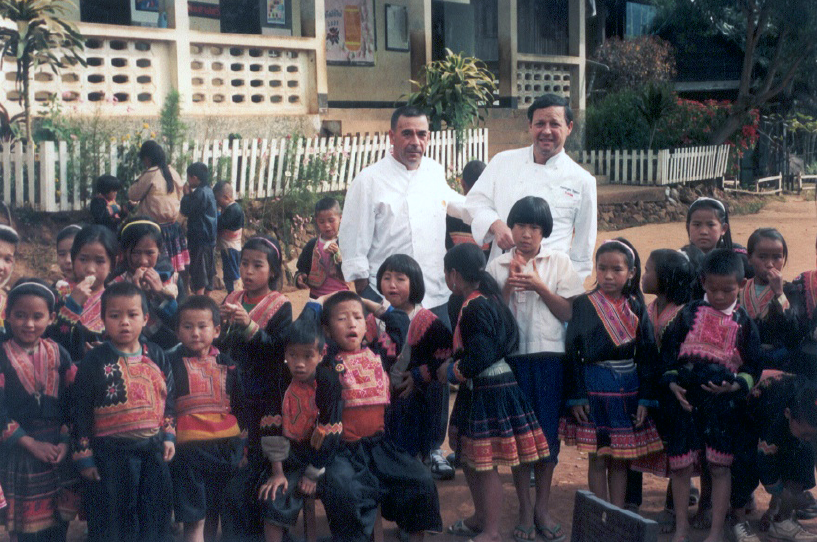
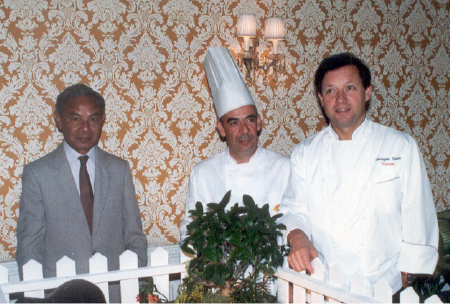
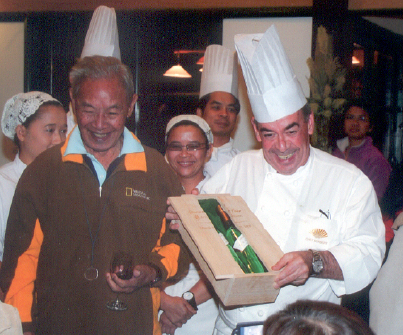
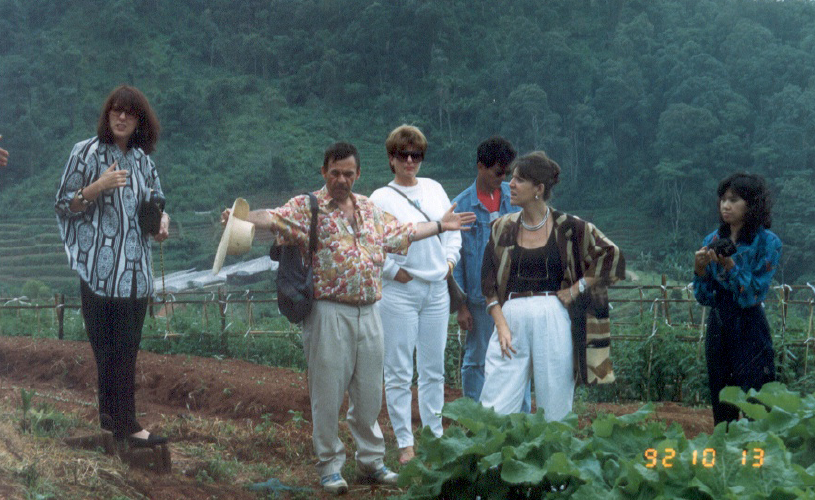
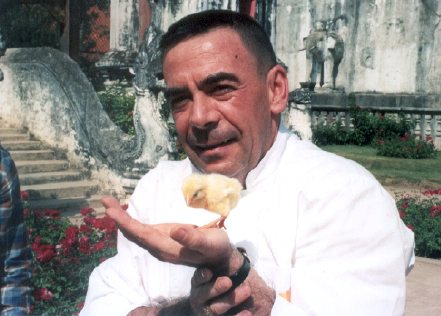
 RSS Feed
RSS Feed
















